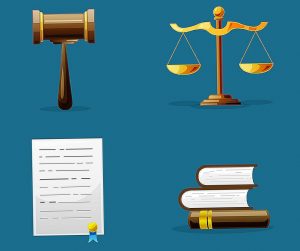A day in the life of a lawyer (an essay): It is no news that the legal profession is one of the most demanding and grueling professions in the world. Most lawyers work close to ten hours a day, with little or no breaks in between, because of the bulk of the work involved. It must also be taken into consideration that the legal profession changes regularly, as laws are repealed and new laws are promulgated, so as to meet the current trends and needs of society. That is why lawyers must read up on these new developments, so that they can stay up to date with the requirements of the legal industry.
Generally, a day in the life of a lawyer is nothing less than eight hours per day, and fifty hours per week. The long hours lawyers put in daily and weekly is because of the obligations the profession imposes on them. Funnily, the notion that people have of attorneys at law going to court in the morning and spending the major parts of their day battling in court before the judge and panels of jurors, arguing a motion or appeal is not really the reality. In real life, the lawyer’s daily routine is quite different from what is dramatized in the movies. What is written below is a perfect example of what the day in the life of a lawyer looks like.

Also see: Best law apps for lawyers and law students in 2021
The activities and tasks a lawyer would carry out in a day depends largely on his specialization or area of legal expertise. An attorney who is laser focused on labor law will of course spend a lot of time in courtrooms or administrative hearings, as opposed to other lawyers who work in real estate or business law. Lawyers start their day very early. Most lawyers wake up from sleep at the early hours of the break of dawn. They do this consistently and constantly every day. This is because they are required by their bosses to arrive early in the office every morning. During that period of the morning, they can settle one or two personal issues, or finish one or two tasks before heading out to work. Also, at work, they can be a little productive as the office is not officially open for the day.
This automatically means that there are no phone calls, court appearances or client meetings, therefore they can focus on finishing one or two tasks on their to do List. Lawyers use this cool time to reply messages, emails, and other data they might have received. They also read up on articles and work tasks in the morning. Most of the lawyers who will later head out to court to defend the client or carry out a procedural function, use this free time to review their cases, practice that arguments, and get ready for the hearing. They draft and compile their court documents, prepping and revising the salient points and issues.
They also try to stay calm and remain cool while doing all these, as the rest of the day may be hectic or demanding. This is the period lawyers use to prepare some of the numerous documents related to their active cases. Most of these documents include motions, pleadings, writ of summons, memorandums, affidavit, witness statement on oath. Usually, drafting these document take time, and that is why mornings are perfect for this, as it is quiet and they are still calm and alert.
This period of time is largely characterized by peace and quiet, therefore lawyers make sure to maximize it. By this time of the morning, phones are not ringing, clients are not scheduled for appointment and there are no conference room meetings. The lawyer is adorned with his private time to reflect common strategies, schedule his activities and tasks for the day. He creates a mental picture of how he wants his day to look like. He may go as far as penning them down on paper for easy recollection and reference. Apart from drafting, practice and scheduling, lawyers use this time to catch up on academic work or carry out further research on specific areas of law.
This is most especially in the case of lawyers who are furthering their careers in various high institutions. The perfect time to catch up on reading is the early hours of the morning, and they endeavor to capitalize on this. They may not have enough time to study during the day because they may be so preoccupied with work, and the nighttime is usually reserved for rest and a good night’s sleep, so the mornings are the best time for personal and individualized study.

RECOMMENDED: How to sue someone in another country
The lawyer during business hours is always busy, except when he takes some time off to relax or for refreshments. The lawyer in the office is always spending time on the phone, at meetings, talking to clients and extracting necessary information and facts from them, updating clients on the progress of their cases and furnishing them with relevant data and documents, discussing and reviewing cases, legal principles and research information with clients. Also the lawyer spends time carrying out further research on various legal issues.
Depending on their specialization and area of expertise, lawyers spend most time in the day contacting and liaising with relevant parties on the issues involved in various cases. Sometimes, lawyers leave the office for the purpose of examining evidence. Criminal lawyers can attempt to visit the crime scene, see the murder weapon, interview the witnesses or interested parties outside the office, visit where negligent accident happened, see a road block that is causing nuisance, collect data and statistics, make their assessments, visit their clients in jail, going to court etc.
Lawyers who have their own firms or chambers, or lawyers who are not part of big law firms might also take more tasks that are not directly related to law but are necessary for the smooth functioning of their business, for example, they can source for clients through marketing and advertising, partner with architectural firms to erect a building for their business, hire new attorney and staff for their business etc.
Recommended: Salary of lawyers in the United States of America
During work period also, lawyers can attend classes as part of continuing education. It may be in the form of enrolled in the highest institution of learning or just to stay up to date on recent laws, cases, statutes etc., that is normally required by the bar association. The major responsibilities of lawyers includes:
a. Advising clients.
b. Acting as agents, trustees, guarantors or executers for corporations, businesses or individuals.
c. Negotiation for settlements.
d. Interpreting the law and applying the law to specific cases they come across regularly.
e. Sourcing and gathering evidence for cases and carrying out research on public and other legal records.
f. Counsels hold the brief of their clients at civil courts.
g. Lawyers also represent their clients charged with crime at criminal courts.
h. Lawyers present evidence of both parties to clients. They also use such evidence to defend their clients or prosecute defendants either in criminal cases or civil cases.
i. Lawyers also prepare, draft and edit legal documents for their clients, for example, they prepare leases, wills, power of attorney, deeds, mortgages etc.
j. Lawyers supervise their junior lawyers, associates, legal assistants in their firms and offer them advise and tutelage in order to demystify the legal profession for them.
k. Lawyers first of all examine the legal data, look out for pros, cons and loop holes in order to determine the nature of advise to offer the defendant or complainant in any matter.
l. Lawyers subpoena eye witnesses that will appear in court.
m. Lawyers perform visits to the locus in quo with the judges and courts to examine scenes of events and other relevant evidence.
n. Lawyers ensure that clients files and data are properly arranged and secured so as to prevent private information from leaking to the public eye.

Also see: Why lawyers put on wig and gown in court
Regardless of the time or hours lawyers spend daily or weekly, the aim of the lawyer is to achieve the most favorable result for a client. No one wants to lose a case intentionally, therefore the lawyer makes sure to put in the work, for example, personal injury and workers compensation lawyers can change a person’s life drastically through a settlement or verdict on their behalf, that provides them with the money needed to recover from an accident or injury to their person (physical or otherwise).
Recommended: Countries That Make The Best Cars In The World 2023
Major Problems Lawyers Face Daily
1. Hiring people for law firms and keeping good employees: Every day, hiring people for law firms and keeping good employees are big problems for lawyers. The law field is very competitive, so it’s important for companies to find and keep skilled workers. Finding good people, interviewing them, and making sure they fit in with the company’s culture all take a lot of work. In order to get the best lawyers, firms often offer good pay deals.

This makes it hard for smaller or less wealthy companies to compete. Once you’ve hired someone, keeping them is just as hard. Lawyers may look for jobs that offer a better mix between work and life, chances for professional growth, or a more welcoming workplace culture. High amounts of worry, long hours, and burnout are common problems in the law field that make people want to leave. Firms need to handle these issues to create a positive and helpful work environment that makes it more likely that they will be able to keep good lawyers. To get past these problems, it’s important to keep working at it, have mentoring programs, and offer competitive perks.
2. Delay in Court procedures: Lawyers have to deal with delays in court procedures every day, which can take a long time and make it harder to settle cases. Lawyers have to deal with cases being pushed back, times being changed, and paperwork problems.

This ongoing problem makes things more difficult, necessitates constant case management changes, and may delay the delivery of justice. Lawyers often have to balance trying to make sure that delays don’t hurt their clients too much with pushing for faster and more efficient court processes.
Recommended: Countries With the Best Football Players in the World
3. Fee earner burnout: Lawyers often experience fee earner burnout because their work is so demanding. Lawyers, who are sometimes called “fee earners,” work in high-stress situations and have to meet clients’ standards all the time. Many law companies have an attitude of “billable hours,” which makes these problems even worse by making people work long hours and having little free time. The constant worry and fatigue that come from having to make money and meet business goals can be very bad. Lawyers may have to work late at night and on the weekends, which can make it hard to balance job and personal life. Another source of stress is the mental toll that comes from working with difficult situations or clients. Burnout not only hurts a person’s health, but it also lowers the quality and quantity of work that gets done.
When people are tired and unhappy with their jobs, they may not do as well, make more mistakes, and be less satisfied with their work. Also, lawyers may leave their jobs more often because they are burned out, looking for jobs with better work environments. Fee earner stress needs to be dealt with in a number of ways, such as by encouraging realistic billing standards, creating a helpful workplace culture, offering mental health resources, and supporting efforts to balance work and personal life. To keep a healthy and productive legal staff, it’s important to recognize and deal with stress.

Edeh Samuel Chukwuemeka, ACMC, is a lawyer and a certified mediator/conciliator in Nigeria. He is also a developer with knowledge in various programming languages. Samuel is determined to leverage his skills in technology, SEO, and legal practice to revolutionize the legal profession worldwide by creating web and mobile applications that simplify legal research. Sam is also passionate about educating and providing valuable information to people.